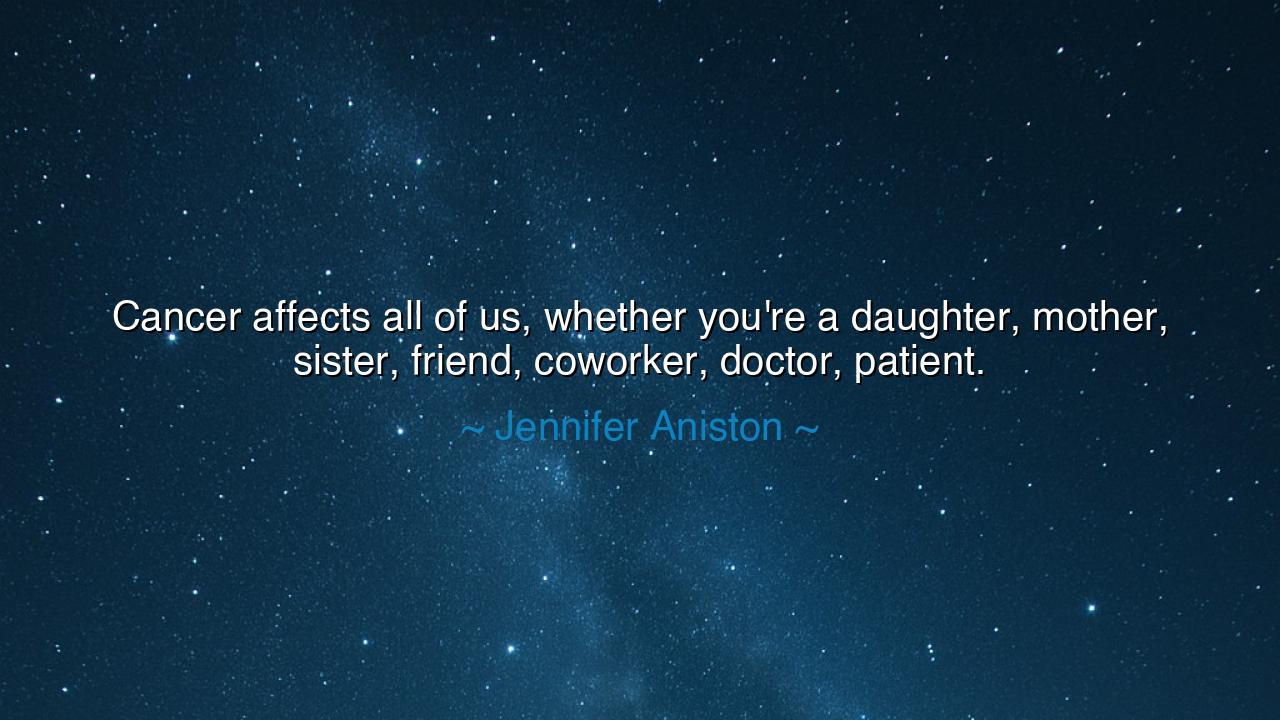
Cancer affects all of us, whether you're a daughter, mother
Cancer affects all of us, whether you're a daughter, mother, sister, friend, coworker, doctor, patient.






Hear the voice of Jennifer Aniston, who in solemn truth declared: “Cancer affects all of us, whether you’re a daughter, mother, sister, friend, coworker, doctor, patient.” These words strike at the heart of our shared humanity, for they remind us that illness is no respecter of persons. It touches the mighty and the meek, the healer and the sufferer, those who watch and those who endure. In this declaration, Aniston speaks not only of disease, but of the web of connection that binds all human souls together.
The meaning of her words is simple yet profound: cancer is not an isolated affliction. It does not strike the body of one person alone, but ripples outward into the lives of all who love, who work, who share bonds of care. The patient bears the physical burden, but the daughter bears the fear, the mother bears the anguish, the friend bears the vigil, and the doctor bears the responsibility. In this way, cancer reveals what life itself has always known—that no one walks alone, and that suffering is a shared weight.
History too gives us testimony. When President Lyndon B. Johnson declared his “War on Cancer” in the 1960s, it was not merely because scientists discovered its threat, but because families across the nation already knew its reach. It had stolen fathers from households, mothers from children, leaders from nations. The disease did not confine itself to one class or profession; it struck everywhere, reminding mankind that mortality is universal. It was this universality that drove societies to unite in research, to labor together for cures.
And yet, the quote also carries a deeper, more tender truth: love makes us vulnerable. It is because we are daughters, mothers, sisters, friends, coworkers, doctors, and patients that cancer wounds us so deeply. It reminds us that our bonds, though beautiful, expose us to grief. But better to love and to grieve, than to live untouched but alone. For even in sorrow, the web of human connection strengthens us, teaching us resilience, compassion, and unity.
Consider the story of Terry Fox, a young Canadian whose leg was claimed by cancer, yet who chose to run across his nation to raise awareness and hope. His suffering became not only his own, but the burden and inspiration of millions who joined him in spirit. Here lies the truth of Aniston’s words: that though the disease isolates in the body, it unites in the soul, for everyone touched by it becomes a participant in the struggle, a bearer of the flame of hope.
The lesson is clear: do not think of cancer—or any great trial—as something that belongs to others alone. Recognize that it is a challenge to us all, a summons to compassion, generosity, and support. Whether you are a healer, a companion, or one who suffers yourself, your role is vital. In the face of illness, indifference is betrayal; only through unity and care can humanity endure.
And so, let your actions follow. If you know one who suffers, do not stand far off. Offer your hand, your time, your comfort. Support research, speak openly, and honor those whose journeys with cancer have been fought with courage. Live in such a way that you strengthen the web of compassion, so that none who endure this struggle walk alone.
Thus remember the wisdom of Jennifer Aniston: “Cancer affects all of us.” For it is not only a disease of the body, but a test of the heart. And when faced together—with love, respect, and unwavering solidarity—this burden becomes not only lighter but also the forge in which humanity’s truest strength is revealed.






AAdministratorAdministrator
Welcome, honored guests. Please leave a comment, we will respond soon